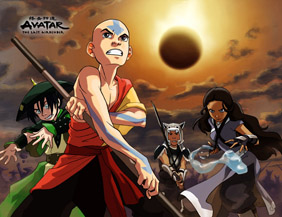Mythology
By Martin Felipe
August 4, 2010
BoxOfficeProphets.com

The show-slash-movie in question here is The Last Airbender. I make it clear that I am unfamiliar with the source material because I don't think you need to be a fan to understand why the movie fails. Now, I'm no Shyamalan critic, like most of this site's contributors. I can find something to like in most of his work, but there's just no excuse for the awfulness of his latest movie.
I repeat, it's important to note that I haven't seen so much as a single episode of the show upon which he bases the movie. It's important because there is clearly something engaging about the mythology of the show which Shyamalan misses.
One could argue that the program has as loyal a following as some of its live action mythological counterparts such as Lost, Buffy the Vampire Slayer or Battlestar Galactica. As an Avatar virgin, I can see the appeal of a fantasy world designed around those who manipulate the four elements. I can imagine the pleasure derived from exploring the minutia of societies built around these elements. I understand how the Avatar's quest to bend all four elements and defeat the Fire Nation is representative of the so-called hero's journey.
I plan on watching the show soon, and I'm sure I will enjoy exploring this world, so no, Shyamalan's misstep isn't going to sour me on what is, by all accounts, a rich engaging mythology. One of the great pleasures of watching these mythology shows, and movies for that matter, is immersing oneself in the fantasy world. I look forward to doing so with Avatar.
Problem is, because the world isn't real, the creators must go to great lengths to establish an authenticity. All of his flaws aside, George Lucas illustrates how to do this in his original Star Wars. Much has been written about his lived-in universe. The Galaxy Far, Far Away doesn't look pristine, it doesn't look artificial. It's beat up, run down, yes, lived in. This helps to create the sense that this galaxy extends far beyond the reach of the frame we see and of the story we experience. Luke and his pals' adventures seem like just a fraction of this sweeping galactic society that we're peering into.
The effect this has on the viewer is one of authenticity. We feel swept up in this grand civilization, the unknown stories we presume are happening outside of the main one helps us to take an epic about Jedi Knights and Wookiees seriously.
Contrast this with the more timid closed-off world of Shyamalan's Airbender. We know there's more to the world, because the characters keep telling us so, not because we feel it in any way. Everything looks artificial, composed, even the lived in quality seems calculated, not really lived in. It's beautiful set and costume design, but doesn't seem to be much more than just that. The world never feels like it extends beyond the boundaries of the story, never seems more complex than the broad strokes the constant expositional dialogue tells us.
There's a very unfortunate line one character lobs at Dev Patel's Prince Zuko, claiming that he's like a boy playing dress up in his uniform, paraphrased of course. Problem is, all of the characters feel like this, none of them seem a part of anything greater than the events we see on the screen. The entire problem with the film is summed up in this one line.
Of course, if Patel and his fellow actors had seemed at all like they were actually living in this world, and not just pretending to, it would have gone a long way towards selling the concept to the audience. Again, Lucas shows Shyamalan how it's done. Not one known for being an actor's director, Lucas nevertheless gets it right in Star Wars with both Alec Guinness and Harrison Ford. Shyamalan's actors either take themselves too seriously, or the mythology not seriously enough. Patel and the other younger actors invest each line with deadly gravity, while the older actors seem bemused with the foolishness that they're portraying.
One could see such a fantasy as foolish. It's not real, after all. The trick is to make it real, without losing one's sense of humor. Guinness and Ford strike the balance of taking the mythology seriously, just not themselves too seriously. This, I believe, is the key to this kind of acting. Look at all of the most successful performers in modern mythologies - Ian McKellan, Terry O'Quinn, Laurence Fishburne, Edward James Olmos, pretty much the entire Harry Potter cast - these actors believe in the rules of the universe, but know that all universes are filled with irony. Rather than making the mythology bear the brunt of this irony, they invest their characters with it.
Before I saw the movie, I figured folks were just giving Shyamalan a hard time again. I assumed that, though not a huge money maker, its $130 million domestic plus tons more overseas grosses would make it successful enough to keep Shyamalan on board for any possible sequels. Now that I've seen what can only be considered a travesty to the Airbender show's fans, I have to say, if this franchise should continue on the big screen, they'll have to hand the directorial reigns off to someone else. Making a fantastical mythology palatable to real world audiences is a specialized skill, a skill I don't think Shyamalan posseses. I'm not a fan of mixing up directors for sequels. In general, I find a consistent voice is necessary to make a continued franchise work. In this case, we need a voice who can speak the language, because M Night sure can't. There's nowhere to go but up.